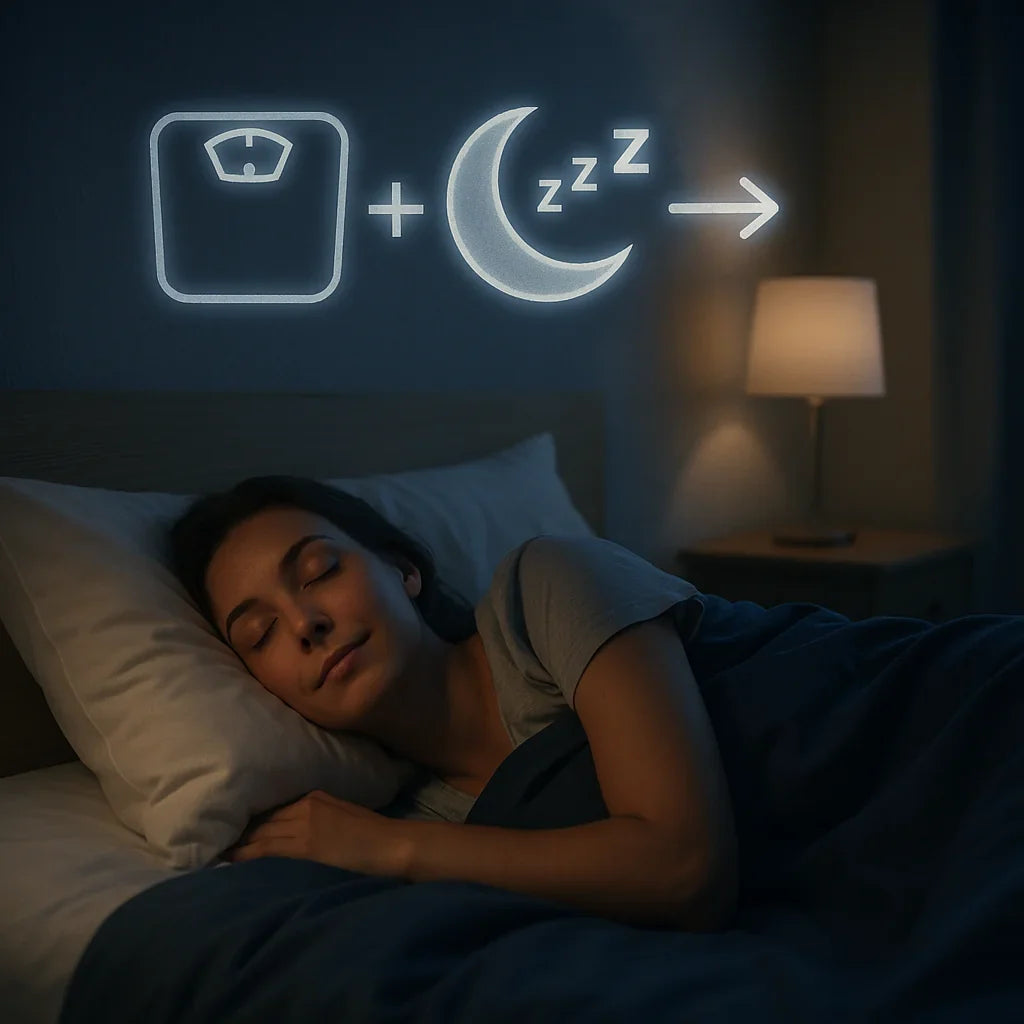The Sleep-Weight Connection: Can Better Sleep Really Help You Lose Weight?

It’s not just diet and exercise – sleep is the third pillar of weight loss. Discover how getting better sleep can regulate your hunger hormones, boost fat burning, and yes, even help you shed those extra pounds more easily.
It sounds a bit like magic: sleep more and lose weight. While it’s not instant or direct (you can’t just snooze away the pounds in one night), the connection between good sleep and healthy weight is very real. Skimping on sleep can sabotage your weight loss efforts in several sneaky ways. Conversely, improving your sleep quality and duration can set the stage for easier fat loss and a happier, healthier you.

Hormones While You Snooze
Sleep is a time when your body plays hormone orchestra:
-
Leptin: This is the hormone that signals fullness to your brain (long-term regulation). During adequate sleep, leptin levels are maintained. But when you don’t sleep enough, leptin levels drop, meaning your brain gets a weaker “I’m full” signal. Ever noticed how after a late night you could eat and eat and not feel satisfied? Low leptin could be why.
-
Ghrelin: The hunger hormone we talked about. Ghrelin **rises when you’re sleep-deprived. One famous study found that people who slept 5 hours had significantly higher ghrelin and lower leptin than those who slept 8 hours – effectively making them hungrier and less easily satisfied. In practical terms, you might consume hundreds more calories on a bad sleep day without even realizing it because your body is nudging you to eat more.
-
Insulin Sensitivity: Poor sleep (even a single night of 4-5 hours) can make your cells more insulin resistant, almost like temporarily aging you into a pre-diabetic state. This means your body needs to pump out more insulin to handle blood sugar, which, as we know, can promote fat storage. Chronically, this is a recipe for weight gain and risk of type 2 diabetes.
-
Cortisol: Sleep deprivation is a stress, so cortisol can be elevated at the wrong times. High cortisol in the evening can impair your sleep further and also encourage fat storage (especially visceral fat).
-
Growth Hormone: This hormone is released during deep sleep and helps with fat burning, muscle building, and repair. If you don’t get enough deep sleep, you miss out on growth hormone release which is like missing out on a natural nightly fat-burning and muscle-recovery opportunity.
Behavior and Willpower
Beyond hormones, there’s the obvious: when you’re exhausted, your resolve weakens. You’re more likely to grab that sugary latte or skip the gym. Cravings for high-energy (calorie-dense) foods shoot up because your body is seeking quick fuel to combat fatigue. Brain imaging studies show that the reward centers in the brain light up more in response to junk food when people are sleep-deprived versus well-rested. So you’re biologically more prone to indulge in poor choices when sleepy.
Also, if you’re awake more hours, there’s more time to eat. Those who sleep less might find themselves doing late-night snacking simply because they’re up. If your bedtime is 1 AM instead of 10 PM, that’s 3 extra hours in which you might raid the fridge.
So, Can Better Sleep Help Lose Weight? Absolutely, Yes.
Think of good sleep as the foundation that supports diet and exercise efforts. When you’re well-rested:
-
You have more energy to be physically active and to cook something healthy (instead of ordering greasy takeout because you’re too tired).
-
Your hunger and fullness hormones (ghrelin and leptin) are better balanced, so you naturally eat a more appropriate amount.
-
Your metabolism is more revved – studies find that people tend to burn more calories after a good night’s sleep than after a bad one (partly due to more movement when you’re not dragging).
-
You store less fat because insulin and cortisol are behaving.
-
You gain more muscle from workouts because growth hormone and testosterone (in both men and women) that rebuild muscle are optimized with sleep.
One large study found that over years, people who average 7-8 hours of sleep had more success keeping weight off, whereas those who slept under 6 hours were more likely to become obese. Another short-term study with dieting showed that people who dieted with adequate sleep lost more fat, whereas the sleep-deprived dieters lost more muscle – so even weight loss quality (fat vs muscle) is affected by sleep.
Tips for Better Sleep (for Better Weight)
-
Stick to a Schedule: Try to go to bed and wake up at consistent times, even on weekends. A regular rhythm reinforces your circadian clock, making it easier to fall asleep and wake up naturally.
-
Wind Down Routine: In this screen-filled world, we need a buffer zone. The blue light from phones/computers tricks your brain into thinking it’s daytime. Aim to power down electronics at least 30-60 min before bed. Use that time for calming activities: read a (paper) book, stretch gently, practice deep breathing or meditation, or take a warm bath. This signals your body that sleep is coming.
-
Optimize Sleep Environment: Cool, dark, and quiet is the mantra. Keep your bedroom slightly cool (around 65°F or 18°C is often cited). Ensure the room is dark – use blackout curtains or an eye mask if needed. Earplugs or a white noise machine can help if you have noise disturbances. And make your bed comfy – a good mattress and pillows are health investments.
-
Watch Late Eating and Caffeine: Eating heavy meals right before bed can disrupt sleep (digestion can keep you up or cause acid reflux). Try to finish dinner at least 2-3 hours before bedtime. If you need a snack, keep it light and easy to digest (a small yogurt or a piece of fruit). As for caffeine, its effects can last 6+ hours, so cut off by early afternoon if you’re sensitive. Even that 4pm coffee could be hurting your 10pm sleep.
-
Mind the Nightcaps: Alcohol might make you drowsy, but it wrecks sleep quality, causing more awakenings and less deep sleep. If you drink, moderation and timing (earlier in the evening) is key. Swap that late-night glass of wine for a herbal tea and you’ll likely snooze more soundly.
-
Exercise (at the right time): Regular exercise improves sleep, but try not to do very vigorous workouts in the late evening, as it can rev you up. Gentle stretches or yoga are fine pre-bed, but save the intense stuff for earlier in the day.
By improving your sleep, you’re indirectly supercharging your weight loss efforts. It’s like creating a favorable hormonal landscape where your body wants to shed fat rather than cling to it. Many women find that once they start sleeping better, they break through weight plateaus that had previously been stubborn.
So, if you’ve been dieting and exercising with mediocre results, take a hard look at your sleep. Are you getting enough? Is it quality sleep? By answering these, you might unlock the missing piece of your weight loss puzzle. In the holistic approach of Beyond GLP-1, sleep is non-negotiable – it’s truly the restorative time when all the day’s efforts (healthy eating, workouts) are consolidated into results, be it muscle gain or fat loss. Sweet dreams are not just good for your soul, they’re great for your waistline too!



